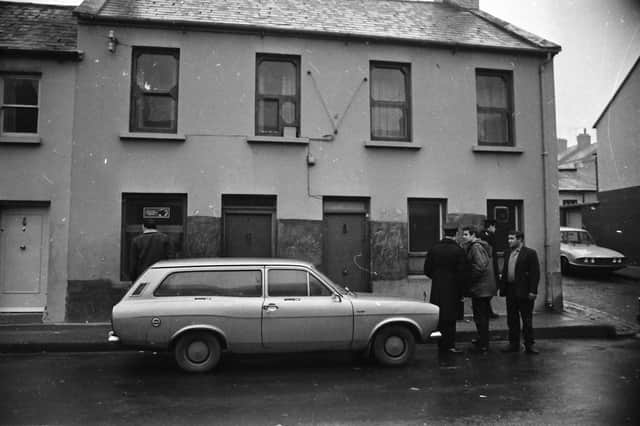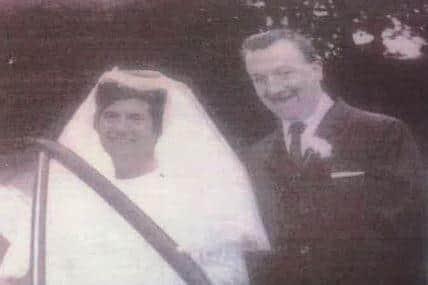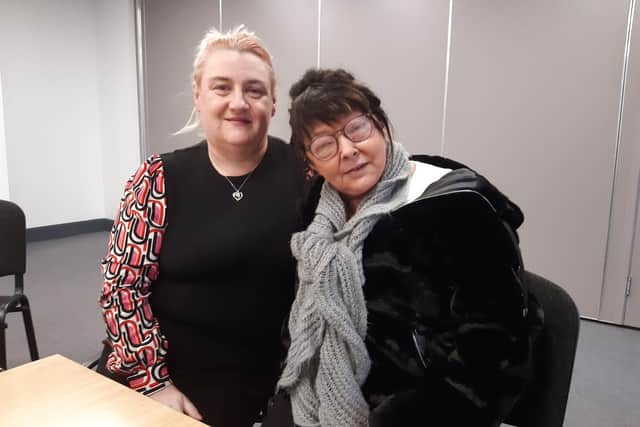Bloody Wednesday: Michael McGinley Annie’s Bar 50th anniversary


It’s an abiding memory of his niece Christine.
"He taught me how to make toffee apples. I used to sell them out the back. Everybody loved those toffee apples,” says Christine, who remembers her uncle fondly.
“I was always his favourite until his daughter Gillian came along. He had a house in Anderson Crescent. I went there every day to do my homework with him.


Advertisement
Hide AdAdvertisement
Hide Ad"Gillian came along when I was nine. Because I had four brothers I had always wanted a wee sister. He said, 'there's your wee sister now'. He adored her. He was so protective. Me and him used to take her out walks in the red pram over to my granny’s.”
Christmas of 1972 would have been Michael and his wife Patricia’s first with Gillian.
Things were going well. The 37-year-old had a good job in Molins, the cigarette-machine manufacturer in Maydown. He and Patricia had been married a year. Gillian was seven months so a wee bit too young to fully take in her first Christmas.
Michael used to call down to the pub of an evening to while away a few hours.


Advertisement
Hide AdAdvertisement
Hide Ad"Mickey went down every night for two stout. The family used to joke and call him 'Mickey Two Stout,'” says Christine.
Before leaving home for the last time he wheeled Gillian, his pride and joy, up and down the room.
He normally went to a bar on the Dungiven Road but on December 20, 1972, he told Patricia he would only go as far as Annie’s.
At 10.30pm loyalist gunmen entered the packed bar and fired 20 shots. Fifteen rounds were fired from a Sterling sub-machine gun; the others from a handgun.
Advertisement
Hide AdAdvertisement
Hide AdMichael was among five innocent victims who died in the hail of bullets. The ‘Journal’ called it ‘Bloody Wednesday’.
Charles Moore, aged 31, of Spencer Road; Bernard Kelly, aged 28, of Mimosa Court; Charles McCafferty, aged 32, of Anderson Crescent; and Frank McCarron, aged 58, of Strabane Old Road, were also murdered.
The horror of that night of mayhem has never left Christine.
“I remember everyone squealing. It was pandemonium. It will never leave my head. I was sitting at the top of the stairs and I could hear my uncle Alfie shouting 'Aw Mick...'
Advertisement
Hide AdAdvertisement
Hide Ad"That night I remember the cries of everybody. My uncle Alfie covered in blood at the bottom of the stairs. My aunt Pat squealing out of her, everybody, all these sirens.
"Alfie told me later on that he died in his arms. Blood was coming out of his mouth. He had been shot in the jugular vein. Alfie was squealing out of him. We weren't allowed down the stairs.”
Gillian was oblivious due to her age. A small mercy. She had lost her father.
“When you think about a child and this happening just coming up to Christmas,” says Gillian. “I was only a wee baby. That would have been their first Christmas with me. I had no memory of it.”
Advertisement
Hide AdAdvertisement
Hide AdEarlier that day Michael was spotted by a relative walking up the Strand Road carrying a huge teddy bear wrapped in clear plastic. Gillian says his wife Patricia had bought him new shoes. He was wearing them when he was shot.
“My mother went down to the bar. She heard there was the shooting. She knew he was dead. She saw the bodies. She had just bought him new shoes,” says Gillian.
Patricia, who is since deceased, carried the hurt with her in her own quiet and stoic way like that of so many bereaved wives and mothers.
"She never remarried, never really spoke about it again,” says Gillian. “She just had her own routine. She moved back home [to Creggan] with her mother. It was me, her and my granny. She went to bingo, went to the machines, went to her work.”
Advertisement
Hide AdAdvertisement
Hide AdIt is believed the massacre was carried out by the Ulster Defence Association (UDA), although the organisation, which wasn’t proscribed by the British Government until 1992, did not claim responsibility.
A yellow Ford Zephyr used by the killers as a getaway vehicle was stolen from a car park at the rear of Clooney Terrace. It was burned out less than a mile from Annie’s Bar on the Trench Road.
It has been suggested the attack may have been carried out in retaliation for the murder of 28-year-old Ulster Defence Regiment (UDR) man George Ellis Hamilton, who worked for the Derry Development Commission and was shot dead by an IRA sniper at the Croppy Hill reservoir that day.
The massacre had a deeply traumatising effect on the community.
Advertisement
Hide AdAdvertisement
Hide Ad"After my uncle Mickey died I developed a fear of passing that bar and knowing there were bad men up there. ‘They hate us’, was what I felt. ‘They might shoot us all’. I used to run down past the bar to school on the Chapel Road. I was never bitter but after that there was the fear of getting shot.”
Christine and Gillian do not believe the victims and their families have ever been close to getting justice. Five men were arrested after the attack but no-one has ever been held to account.
“I don't feel they even chased it up,” says Christine.
"A lot of stuff was hidden and brushed under the carpet because of the Troubles,” adds Gillian.
Both believe the multiple shooting is the ‘forgotten atrocity’ of the conflict.
“It was the forgotten massacre,” says Christine.
Advertisement
Hide AdAdvertisement
Hide Ad"There are people I've mentioned it to, especially with the 50th anniversary coming up, and people have said, for what? Annie's Bar. They've never heard of it,” observes Gillian.
This year a series of commemorative events are planned to mark the 50th anniversary of the killings. For Gillian and the families it will be an opportunity to remember.
“They were all gentlemen. Just in watching TV,” says Christine.